Custom alerts and data visualization let you quickly identify and prevent power supply issues.
The Auto-Discovery feature of Paessler PRTG helps you set up your monitoring in minutes. PRTG will keep you on top of the status of your power equipment, such as UPSs and PDUs, and inform you how they are performing.
If your UPS devices support SNMP, PRTG will automatically detect them and create sensors to monitor their health and availability.
PRTG will immediately alert you to power-related events, outages, and equipment failures so you can act as quickly as possible.
Set specific warning and error thresholds so that PRTG can notify you about problems with batteries that need replacement or heavy loads where your batteries would not meet your runtime requirements.
PRTG power supply monitoring should be part of your power backup and monitoring strategy. Monitoring and staying aware of the status of your power systems is crucial to reducing unplanned outages and helping you achieve 99.999% uptime.
Use PRTG’s historical monitoring data to analyze power capacity and resources, and report to your management on how to optimize your power supply system based on facts, not suppositions.
Diagnose network issues by continuously tracking the condition, health, and performance of your UPS and PDU devices. Show battery runtime, voltage, plug status, and more in real time. Visualize monitoring data in clear graphs and dashboards to identify problems more easily. Gain the overview you need to troubleshoot issues with your power supply system.
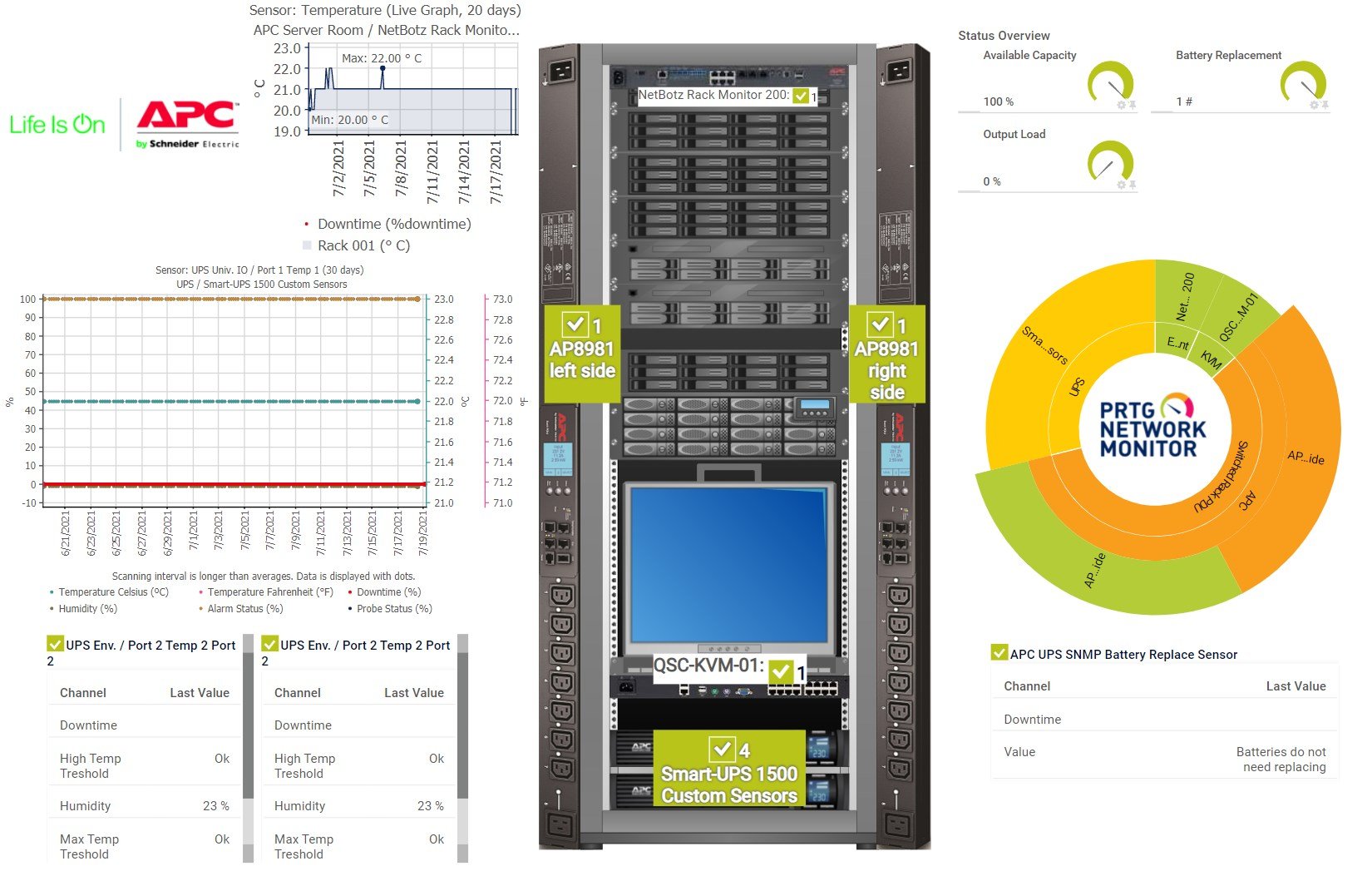
Custom PRTG map of an APC server room
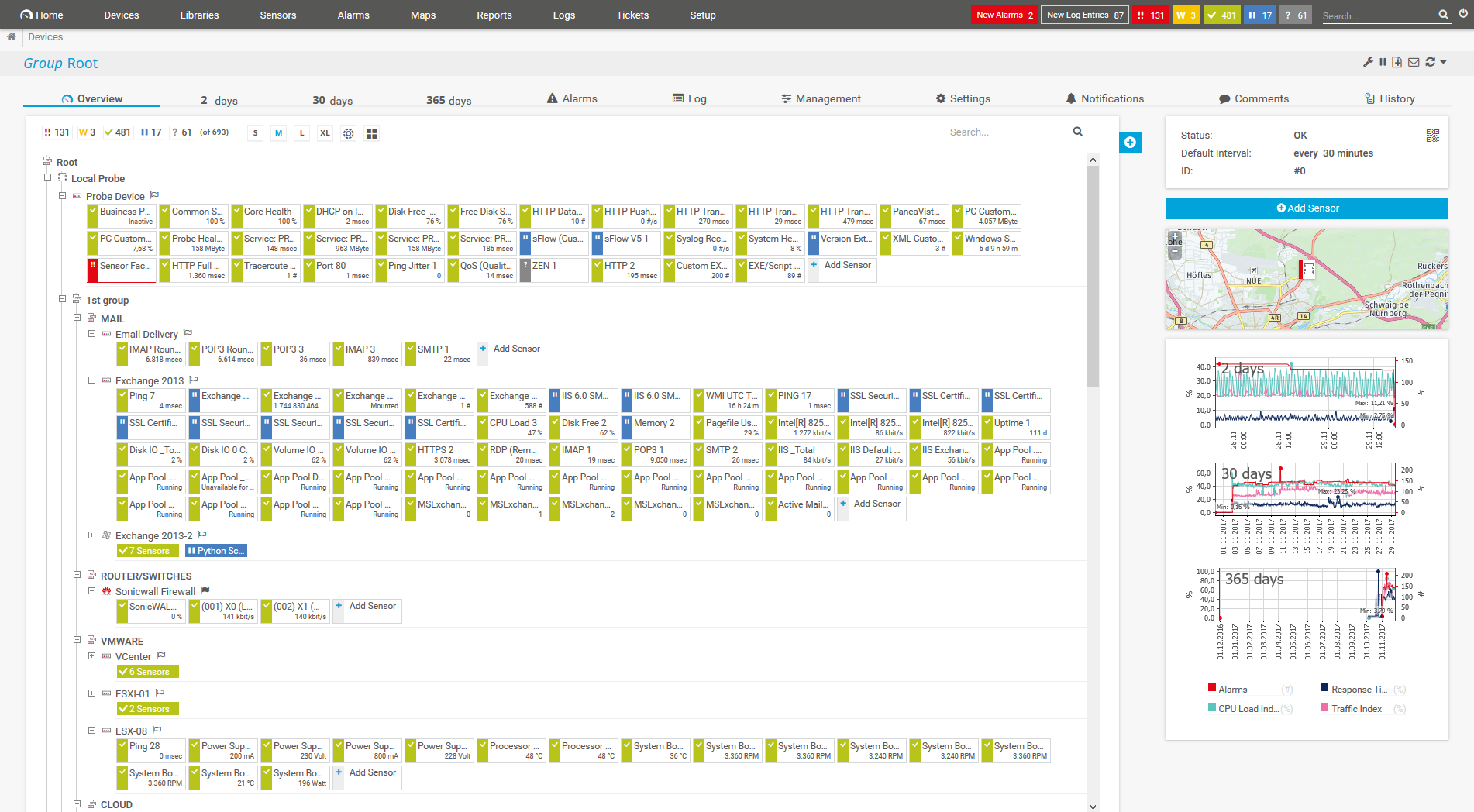
Device tree view of the complete monitoring setup
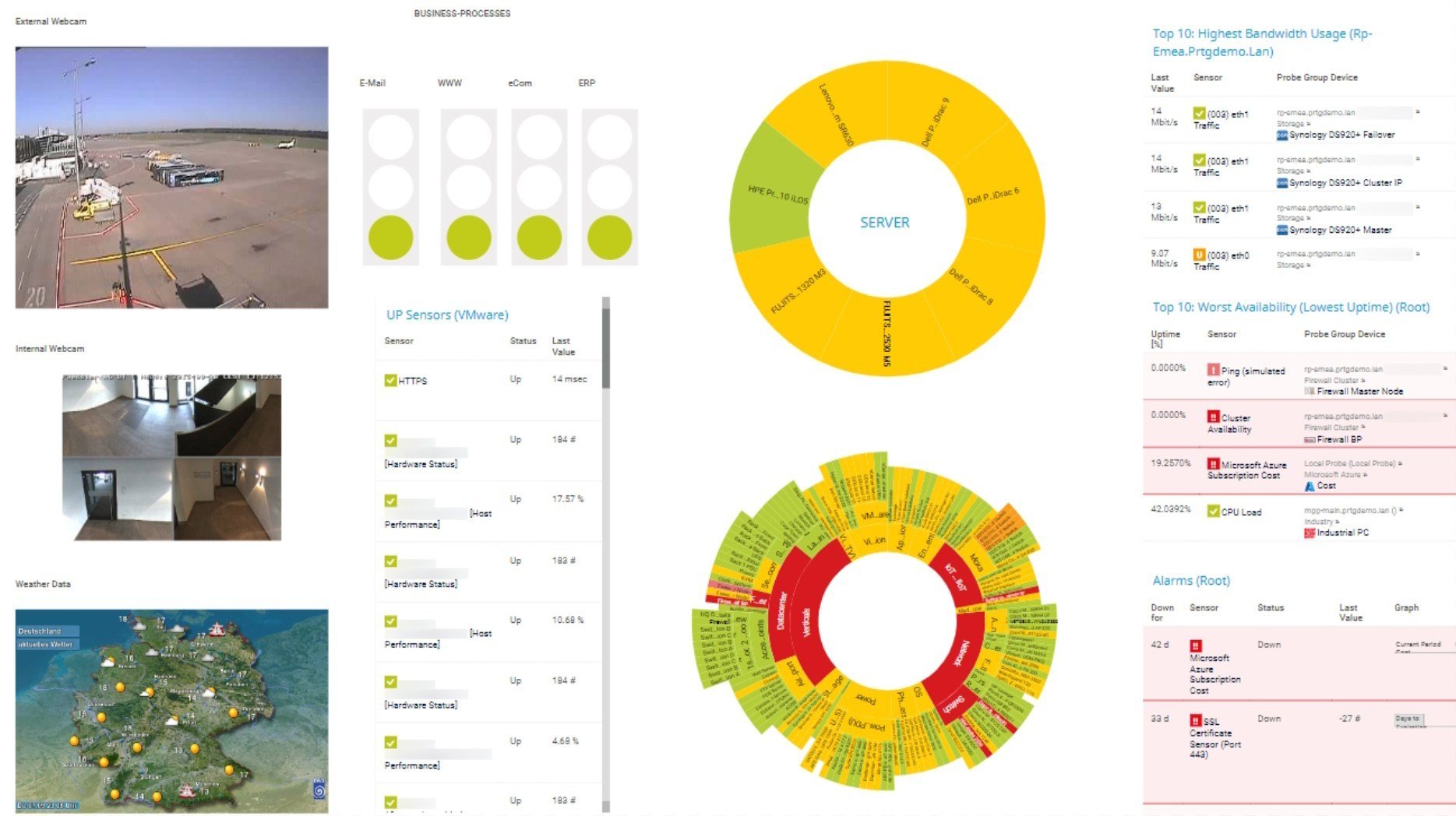
Custom PRTG dashboard for keeping an eye on the entire IT infrastructure
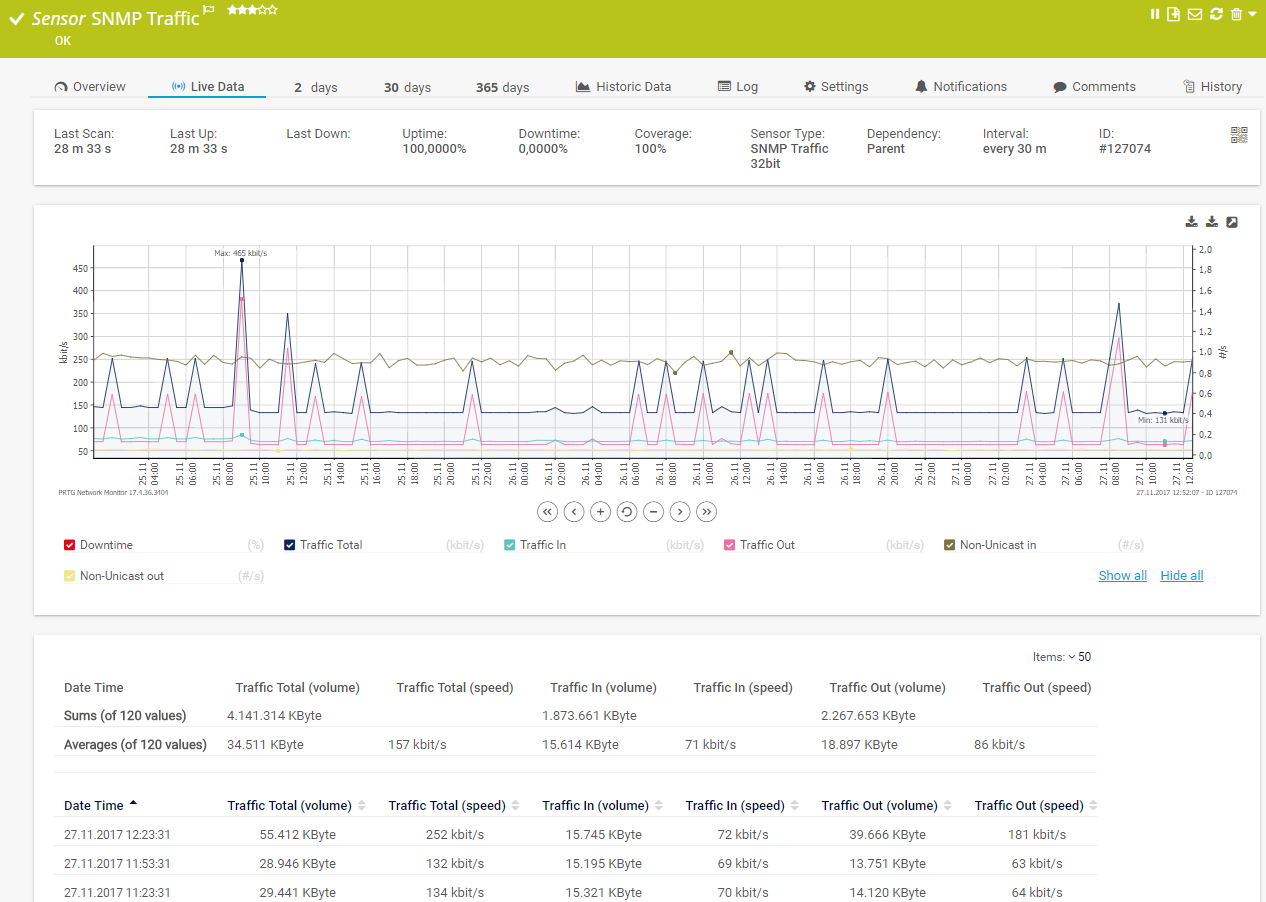
Live traffic data graph in PRTG
PRTG can also watch your routers. In the event of error messages, high bandwidth usage, or suspicious traffic, the notification system of PRTG automatically sounds the alarm.
From web to database and mail servers, PRTG server monitoring lets you keep an eye on all the key values regarding the availability and performance of your servers. This helps you increase the stability of your IT infrastructure.
PRTG ensures reliable monitoring of server rooms. Watch temperature fluctuations, humidity, and power outages.
For generic uninterruptible power supplies, PRTG can keep an eye the following parameters, depending on what the device’s manufacturer supports:
You can monitor many aspects of the health of the PDU itself, and often the power draw of each of the plugs. You can also keep track of how much power each of your devices consumes over time.
For power distribution units, PRTG can keep an eye the following parameters, depending on what the device’s manufacturer supports:
PRTG comes with more than 250 native sensor types for monitoring your entire on-premises, cloud, and hybrid cloud environment out of the box. Check out some examples below!
See the PRTG Manual for a list of all available sensor types.
Real-time notifications mean faster troubleshooting so that you can act before more serious issues occur.
PRTG is set up in a matter of minutes and can be used on a wide variety of mobile devices.
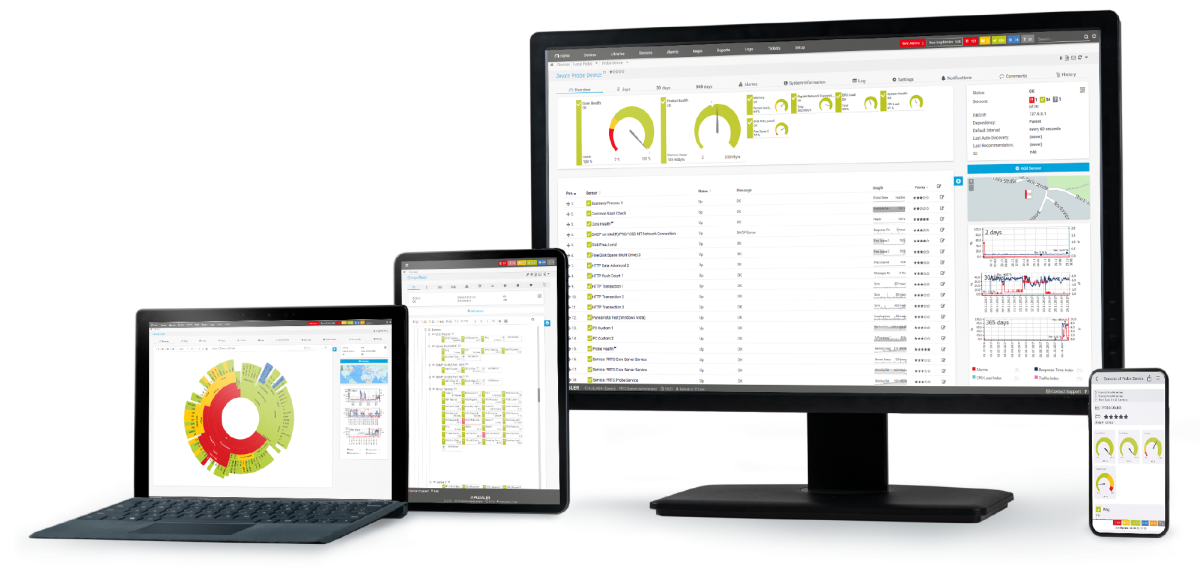
“Excellent tool for detailed monitoring. Alarms and notifications work greatly. Equipment addition is straight forward and server initial setup is very easy. ...feel safe to purchase it if you intend to monitor a large networking landscape.”
Partnering with innovative IT vendors, Paessler unleashes synergies to create
new and additional benefits for joined customers.
baramundi and PRTG create a secure, reliable and powerful IT infrastructure where you have everything under control - from the traffic in your firewall to the configuration of your clients.
Combining their tools to a powerful solution for advanced analysis and automation, KnowledgeRiver and Paessler enable IT teams to ensure best performance for their infrastructure and networks.
Siemon and Paessler bring together intelligent building technology and advanced monitoring and make your vision of intelligent buildings and data centers become reality.
Custom alerts and data visualization let you quickly identify and prevent power supply issues.
Network Monitoring Software – Version 25.3.110.1313 (August 27, 2025)
Download for Windows and cloud-based version PRTG Hosted Monitor available
English, German, Spanish, French, Portuguese, Dutch, Russian, Japanese, and Simplified Chinese
Network devices, bandwidth, servers, applications, virtual environments, remote systems, IoT, and more
Choose the PRTG Network Monitor subscription that's best for you
A UPS stands for “uninterruptible power supply”. It's a device that provides emergency power to a load when the input power source fails. UPS systems are commonly used to protect computers, data centers, telecommunication equipment, or other electrical equipment where an unexpected power disruption could cause data loss, damage, or downtime.
UPS units typically incorporate batteries or supercapacitors to store energy, which can be quickly deployed when the main power source fails. They also often include surge protection and voltage regulation features to ensure stable and clean power delivery to connected devices.
A PDU stands for “power distribution unit”. PDUs take power from a primary source (such as a UPS or mains power) and distribute it to multiple devices or pieces of equipment within a data center, server room, or other industrial settings. PDUs are typically mounted within equipment racks and provide electrical outlets or connections for servers, networking equipment, storage devices, and other hardware.
UPS monitoring refers to the process of actively monitoring and managing uninterruptible power supply systems to ensure their proper functioning and reliability. This involves continuously monitoring various parameters and metrics related to the UPS units to detect potential issues, prevent downtime, and maintain optimal performance.
Key aspects of UPS monitoring typically include:
Electrical and power systems, like monitoring, are often overlooked as being an important part of the infrastructure. A backup power system at a minimum in the form of UPS, for example, is a must to keep your systems operational in the event of an outage.
Most power outages are fairly short and for critical systems, a UPS should be able to keep you going for 30 minutes or more. This would allow you to get through most outages without interruption and give you enough time to start shutting down systems when the battery charge drops to a critical level.
A UPS combined with a generator for extended outages is desirable for critical systems, though often cost extensive. Unless you are monitoring your power systems, you may still be caught off guard and have systems go offline without a graceful shutdown.
In PRTG, “sensors” are the basic monitoring elements. One sensor usually monitors one measured value in your network, for example the traffic of a switch port, the CPU load of a server, or the free space on a disk drive. On average, you need about 5-10 sensors per device or one sensor per switch port.
Paessler conducted trials in over 600 IT departments worldwide to tune its network monitoring software closer to the needs of sysadmins. The result of the survey: over 95% of the participants would recommend PRTG – or already have.
Paessler PRTG is used by companies of all sizes. Sysadmins love PRTG because it makes their job a whole lot easier.
Bandwidth, servers, virtual environments, websites, VoIP services – PRTG keeps an eye on your entire network.
Everyone has different monitoring needs. That’s why we let you try PRTG for free.